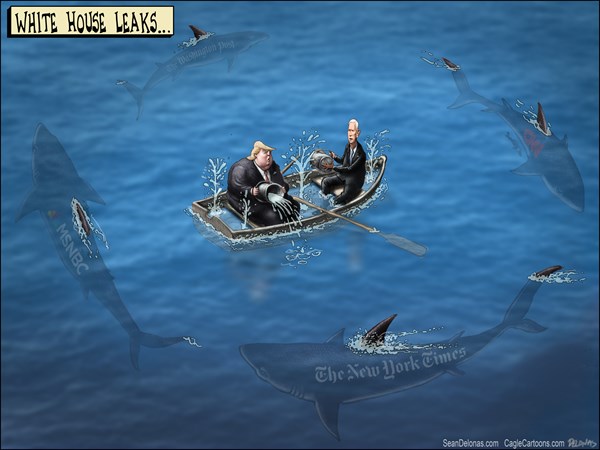
Newly installed White House communications director Anthony Scaramucci is on a mission to plug the leaks that infuriate President Donald Trump.
In a Sunday interview on CNN, Scaramucci previewed a message that he planned to deliver to colleagues on Monday: "I'm going to be having a meeting with the communications staff and say, 'Hey, I don't like these leaks. And so we're going to stop the leaks. And if we don't stop the leaks, I'm going to stop you.'"
That's a very stern warning - and quite possibly an empty one. Here are three reasons:
• Many leaks are beyond the communications director's reach
President Trump's White House is leaky, to be sure, but it is hardly the only source of significant disclosures to the press.
When The Washington Post reported in February that national security adviser Michael Flynn discussed sanctions in pre-inauguration phone calls with Russia's ambassador to the United States, it relied on "nine current and former officials who were in senior positions at multiple agencies at the time of the calls."
When The New York Times reported in May that Trump asked FBI Director James Comey to drop an investigation of Flynn, according to a memo written by Comey, the source of the report turned out to be Comey himself, who later testified that he orchestrated the memo's release to the Times, through a friend, after being fired.
A White House communications director has little, if any, ability to crack down on leaks from intelligence agencies or from people who no longer work in government.
• Leaks are a natural result of the environment Trump created
Trump's White House staff is a collection - perhaps a collision - of different worldviews. There are GOP establishment types like chief of staff Reince Priebus, populists like chief strategist Stephen Bannon and even Democrats like chief economic adviser Gary Cohn. Disagreements and frustrations are inevitable, and it is unrealistic to think that all the drama can be kept in-house.
Each faction within the White House has an incentive to appear more influential than the others. And reporters have a legitimate interest in advisers' relative power - not merely because so-called palace intrigue is, well, intriguing but also because voters ought to know who is accountable for important decisions.
In short, journalists have a good reason to try to find out what goes on behind the scenes, and White House aides have a good reason to tell them.
• Sometimes Trump is the one to spill the beans
We don't need leaks to know that the president is unhappy with his attorney general. Trump told everyone how he felt in a New York Times interview last week.
We didn't need leaks to know that Bannon's stock was falling, in April, after Trump said this to the New York Post: "I like Steve, but you have to remember he was not involved in my campaign until very late. I had already beaten all the senators and all the governors, and I didn't know Steve. I'm my own strategist, and it wasn't like I was going to change strategies because I was facing crooked Hillary."
Sometimes things that a White House communications director would like to keep from leaking out end up in public view, anyway - thanks to the president himself.


 Contact The Editor
Contact The Editor
 Articles By This Author
Articles By This Author